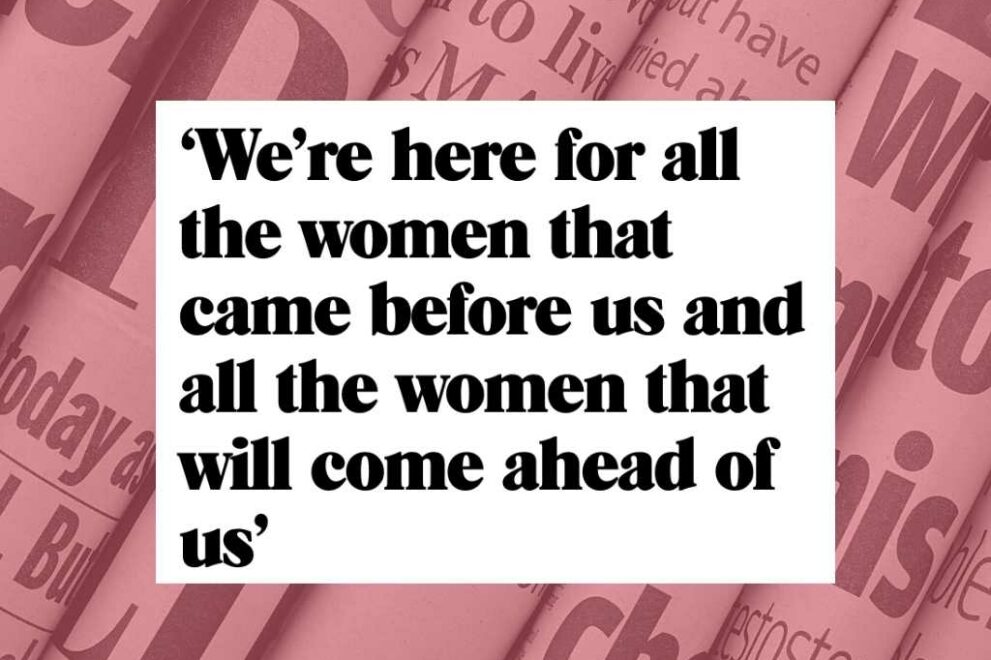Your cart is empty.


Your cart is empty.
18 Mar 2021 Campaigns
Thousands of protesters took to Tarntanyangga Victoria Square on Monday in solidarity with victims of rape and sexual assault. Tears and compounded frustration reverberated through the crowd, against the permeance of gendered violence through everyday life.

This article was published by City Mag 18 March 2021.
Listen to the full interview on The Wire here.
Recent cases instigating this public action include the alleged rape of former Liberal Party staffer Brittany Higgins by a colleague, and a historical 1988 rape accusation levelled at Attorney-General Christian Porter (which he denies).
From within the crowd, CityMag saw speeches in the Square, before protesters marched to Parliament House and back. The first speaker was Kaurna and Wirangu woman Rosemary Wanganeen.
Rosemary tells the crowd colonisation and the “Western patriarchal construct” created the “greater potential” for society’s male elite “to live in privilege”.
“Those living in a society with a Western patriarchal and colonised mindset depend on us as women to fall into a rabbit warren of hopelessness, in the hope that believing is all too hard. But we’re not going to do that, are we?” Rosemary says. The crowd responds: “No”.
“We are going to keep making noise,” Rosemary continues, “and yes, we’re going to get emotional.”
CityMag speaks to a number of protesters while the speeches rage on, including a 67-year-old “survivor of sexual assault”, who we’ve chosen not to name.
She says while working in the corporate world she’d “seen a lot” in terms of sexual harassment. “Enough is enough,” she says.
In another group of protesters, we meet Barbara and Quintin McIntyre. We ask why they’re here. Barbara breaks into tears. Quintin, her husband, answers: “[Barbara] told me before that she wants things to change so her granddaughters don’t go through what she went through.
“You don’t need another review. You need things to actually change.”
Barrister Clare O’Connor also spoke at the event, saying this national effort was spurred on by the last three weeks of “disgusting information” emanating from Canberra, and government leaders need to commit to reform.
“There’s been a very, very good inquiry with 55 recommendations that came down from the Human Rights Commission. It explained how to make a workplace safe,” she says, referring to the Respect@Work report.
“We need to demand action from our politicians in relation to these things. We need to demand action in relation to those workers who are protected, those who do not have to be investigated – those parliamentarians in Canberra. Why are they above the law?”
South Australia has been in the throes of its own toxic parliamentary issues, with the publication of the Acting Equal Opportunity Commissioner’s recent report into parliament finding sexual harassment “prevalent” and “the problem and its solutions sit at an organisational and cultural level”.
The report includes 16 recommendations aiming to prevent and appropriately handle sexual and discriminatory harassment in this particular workplace, however the document reiterates sexism will only really be eliminated “through concerted efforts to create cultural change”.
Another protester, who wished to remain anonymous, says she believes the current government and their “lack of acknowledgment of what people are seeing and feeling” are leaving people “disappointed”.
“The brotherhood is looking after the brotherhood, and so the sisterhood is standing up,” she says.
A former State Government employee Frank Kinner says he turned up to the protest because he’s “sick” of how many women are assaulted and harassed by men.
“I’m not ashamed about being male but I’m embarrassed,” Frank says.
“They will change the legislation, they’ll do protocols, they’ll do everything. That will be nice and shiny but it won’t change the government.
“There needs to be more conversations between fathers and sons.”
Rebecca Mills and Lorna Haynes are both nurses at the Royal Adelaide Hospital and say they are “heartbroken” and “angry” by the number of assaulted women they see presenting to the emergency department.
“In Parliament, there are all these sexual harassment claims, and it’s being dismissed by Scott Morrison and like, ‘Someone’s daughter? I’ll talk to my wife about this.’ It’s not good enough. Actually, do something about it,” Rebecca says.
Australia’s reckoning isn’t happening in a vacuum. Lorna has previously lived in London, and she references the murder in that city of Sarah Everard, and the grief and public outcry it has sparked overseas.
“I would walk those streets as well,” Lorna says. She believes Sarah’s death would add “more momentum in our steps today.”